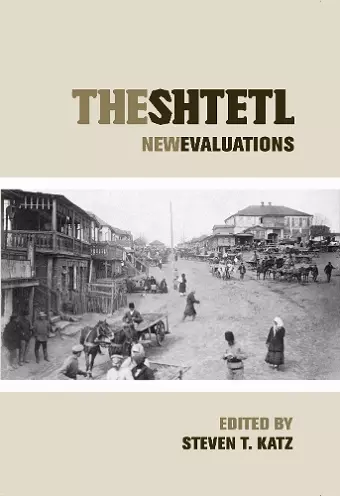The Shtetl
New Evaluations
Format:Paperback
Publisher:New York University Press
Published:1st Nov '09
Currently unavailable, and unfortunately no date known when it will be back

Includes chapters on the history of the shtetl, its myths and realities, politics and gender dynamics
Dating from the sixteenth century, there were hundreds of shtetls - Jewish settlements - in Eastern Europe that were home to a large and compact population that differed from their gentile, mostly peasant neighbors in religion, occupation, language, and culture. This volume takes a look at this most important facet of East European Jewish life.
Dating from the sixteenth century, there were hundreds of shtetls—Jewish settlements—in Eastern Europe that were home to a large and compact population that differed from their gentile, mostly peasant neighbors in religion, occupation, language, and culture. The shtetls were different in important respects from previous types of Jewish settlements in the Diaspora in that Jews had rarely formed a majority in the towns in which they lived. This was not true of the shtetl, where Jews sometimes comprised 80% or more of the population. While the shtetl began to decline during the course of the nineteenth century, it was the Holocaust which finally destroyed it.
During the last thirty years the shtetl has attracted a growing amount of scholarly attention, though gross generalizations and romanticized nostalgia continue to affect how the topic is treated. This volume takes a new look at this most important facet of East European Jewish life. It helps to correct the notion that the shtetl was an entirely Jewish world and shows the ways in which the Jews of the shtetl interacted both with their co-religionists and with their gentile neighbors. The volume includes chapters on the history of the shtetl, its myths and realities, politics, gender dynamics, how the shtetl has been (mis)represented in literature, and the changes brought about by World War I and the Holocaust, among others.
Contributors: Samuel Kassow, Gershon David Hundert, Immanuel Etkes, Nehemia Polen, Henry Abramson, Konrad Zielinski, Jeremy Dauber, Israel Bartel, Naomi Seidman, Mikhail Krutikov, Arnold J. Band, Katarzyna Wieclawska, Yehunda Bauer, and Elie Wiesel.
This is the first book published in the Elie Wiesel Center for Judaic Studies Series.
This important and comprehensive collection provides a fascinating re-evaluation of one of the main locations of Jewish life in Eastern Europe down to the Holocaust and beyond. -- Antony Polonsky,Albert Abramson Professor of Holocaust Studiesat the United States Holocaust Memorial Museum and Brandeis University
[A]nyone looking to really understand the Jewish past, not just the romanticized version of it, will find this book a perfect antidote. * The Reporter *
Talk about stereotype busting! Not only are we forced to readjust our sights . . . but in the best moments of Katz’s collection we learn how to distinguish what is factually true from what is mythically imagined. Even more importantly, we begin to see . . . the world of the shtetlach that the fog and night of the Holocaust forever destroyed. * New Jersey Jewish News *
The quality of the essays is uniformly good, and after reading them, readers will be fully acquainted with the elusive concept of the shtetl. The essays are well documented. * Choice *
The book is a must-buy for all libraries. * AJL Newsletter *
ISBN: 9780814748312
Dimensions: unknown
Weight: 454g
336 pages